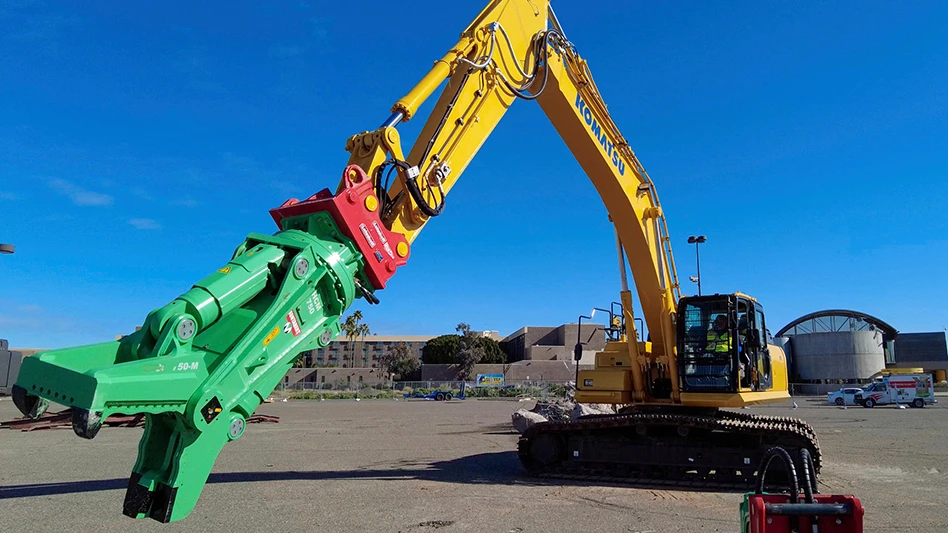
Recycling Today archives
The Washington-based Recycled Materials Association (ReMA) says its review and analysis of the executive orders on inbound steel and aluminum tariffs indicate ferrous and aluminum scrap can continue to trade freely across the United States border.
“After careful analysis of the full presidential proclamations released Friday (Feb. 14) that reinstate the Section 232 tariffs on imports of steel and aluminum, imports of recycled steel and recycled aluminum remain excluded from these particular tariffs,” says Adam Shaffer, assistant vice president of international trade and global affairs for ReMA.
Adds Shaffer, “Scrap had been excluded from the beginning in 2017 and 2018, and will continue to be outside of the scope of these tariffs moving forward.”
The ReMA staff member, who says the organization will continue to “provide insight to its members about the other changes that President Trump is making to the steel and aluminum tariffs, as well as the other tariffs that the White House is proposing.”
He continues, “Last week, we also saw the president begin the process of imposing reciprocal tariffs on trading partners. We’re looking into how this would impact traders of recycled materials and how best to work with the new administration to try to limit these impacts.”
Shaffer says the effective date of the increased tariff rate on aluminum imports from 10 percent to 25 percent is Wednesday, March 12. Previous exemptions for some nations to the tariff rules also are set to expire on that date or a subsequent expiration date set by the exemption language. The 25 percent tariff rate will be placed on steel and aluminum from all nations, including Canada and Mexico.
Specific details on what the Trump administration calls reciprocal tariffs have not yet been announced.
One metals organization that has expressed support for the president’s tariff regimen is the Illinois-based Aluminum Extruders Council (AEC).
In a Feb. 17 statement, that group says it “applauds the Trump administration’s continued efforts to create a fair and level playing field for American aluminum extrusion manufacturers through the Feb. 10, 2025, presidential proclamation, “Adjusting Imports of Aluminum into the United States.”
Continues the AEC, “By closing the loopholes in the Section 232 measures and increasing the tariff rates, the Trump administration’s latest action will help significantly to clamp down on the surge of unfair imports. We believe that removing the exclusions and loopholes, strengthening overall enforcement, and including downstream aluminum-containing derivative products will significantly benefit the American aluminum extrusions industry. This will allow it to restart its unused capacity, rehire furloughed employees and create thousands of well-paying American jobs.”
The AEC says it represents more than 90 extrusion operations in 35 states. The facilities often melt aluminum scrap onsite or use recycled-content aluminum in their production process.
In the runup to the March 12 tariff on all inbound steel, mills located in the U.S. have not yet seen a bump in their production levels.
According to the Washington-based American Iron and Steel Institute (AISI), in the week ending Feb. 15, 2025, domestic raw steel production of 1.67 million tons was down by 0.3 percent compared with the week before and represented a 3.2 percent decrease from the amount of steel made in the U.S. in the comparable week in 2024.
Domestic mills in the most recently completed week operated at 75 percent capacity, down slightly from a 75.2 percent the week before and down more steeply from a 77.7 percent capacity rate in the middle of February 2024.
AISI largely has expressed support for the notion of tariffs offering a form of protection and support for steel mills in the U.S.
The organization’s president and CEO Kevin Dempsey was quoted by Reuters after the universal tariff was announced as saying, “We look forward to working closely with the president and his administration to implement a robust and reinvigorated trade agenda to address the many foreign market-distorting policies and practices that create an unlevel playing field for American steelmakers.”
On Feb. 13, after President Trump set the table for reciprocal tariffs, Dempsey remarked, “AISI applauds President Trump’s action today ordering the development of a comprehensive plan for restoring fairness in U.S. trade relationships and countering non-reciprocal trading arrangements.”
Added Dempsey, in a reference likely to the People’s Republic of China, “Due to foreign government subsidies and other trade-distorting government policies, global overcapacity in the steel industry reached 573 million metric tons in 2024. This overcapacity, if unaddressed, can fuel surges in injurious imports into our market, and the problem of steel overcapacity is not limited to any one country or region of the world.”
Latest from Construction & Demolition Recycling
- Cielo investor requests annual meeting
- CDE sets up washing plant on Long Island, NY
- NWRA: NIOSH cuts a step in the wrong direction
- Ferrous price hikes could be poised to pause
- Northstar secures 15-year lease extension for asphalt shingle recycling facility
- Greenwave asks for SEC filing extension
- Construction Plastics Initiative lines up projects
- ShearCore adds dealership group in Canada






